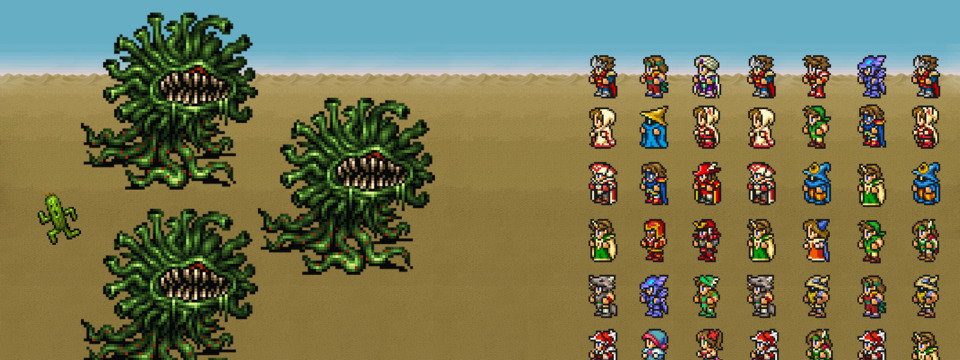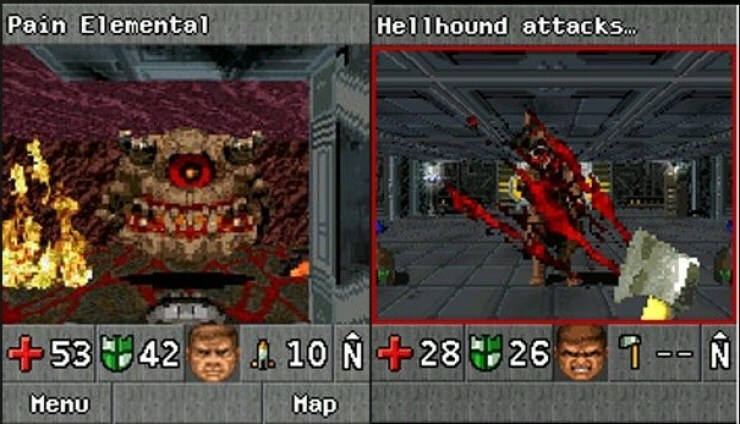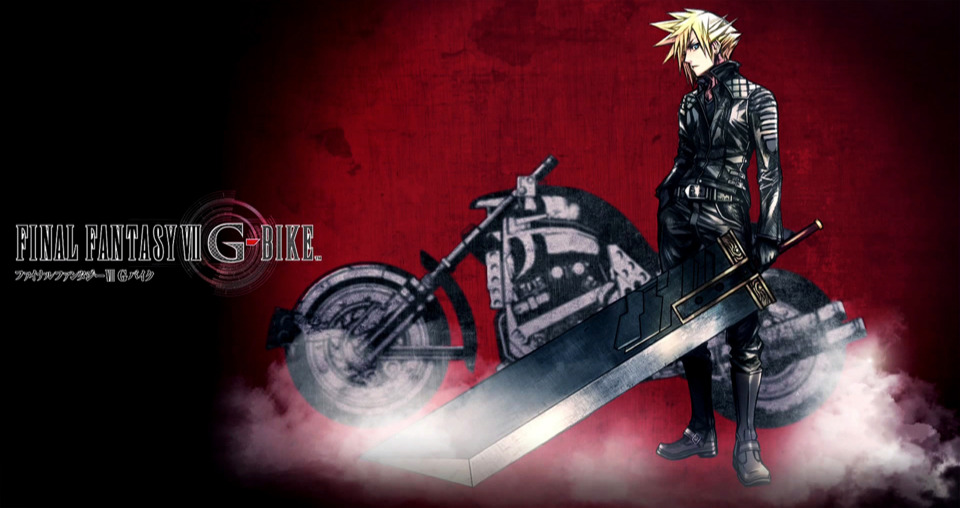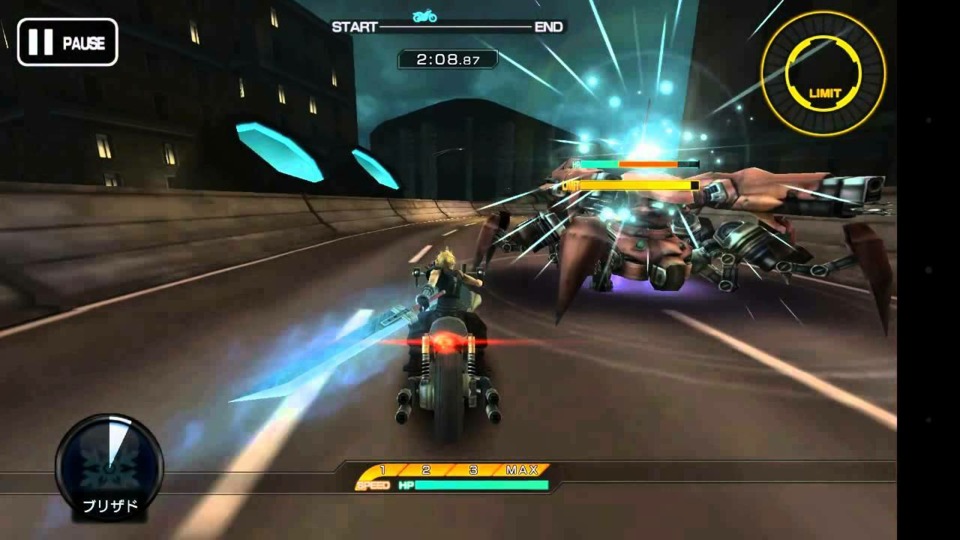How Bad Is The Compilation of Final Fantasy VII Actually? Part 2: OH MY GOD, There So Many FFVII Mobile Games!
By ZombiePie 3 Comments
Author's Note: If you missed it here's a link to previous episode of this series:
Preamble

This week we have another episode of my blog series examining the "Compilation of Final Fantasy VII" or Square's attempt to keep Final Fantasy VII relevant decades after its initial release. Last time, I reviewed the various films and animes that Square-Enix either made in-house or contracted to other studios. This time around, I plan to share a smorgasbord of mobile games that are in any way connected to Final Fantasy VII's canon. So, no, I will not be reviewing Final Fantasy Record Keeper or Final Fantasy All the Bravest. That said, AND HOLY FUCKING SHIT, there were a LOT MORE Final Fantasy VII mobile games than I originally bargained for, some of which I had no idea even existed until I started my research for this write-up. Seriously, how many of you remembered there was a mobile tie-in to Dirge of Cerberus that was still getting content updates until 2018?How did I miss that one?
Speaking of mobile games shutting down, we need to talk about how I played these games. As I discussed on my blog about Mobius Final Fantasy, video game preservation on mobile platforms is "tough." For one thing, you cannot rip the code from a physical copy, and playing around with digital-only pre-Android mobile code is not for the faint of heart. That last point is especially the case for pre-smartphone mobile games, which represents a large portion of what I will be talking about today. None of these games are legally playable anymore, and if it were not for emulation, all would acquire the dubious and lamentable "lost media" label. Now, I had the distinct "pleasure" of playing at least two of these games as God intended. However, the rest had to be played using all sorts of "black magic" and technical trickery. All I will say is, this blog required the greatest amount of engineering know-how I have ever done for a work of writing on this site.

To Square-Enix's defense, this is NOT a problem endemic to them. Even "classic" mobile games such as the original Doom RPG are no longer available to play, and fans have had to patch together recreations as developers rarely have any incentive to release the source code of discontinued mobile games. TWO of the games we will be discussing fall into that specific category. To make matters worse, pre-Android and iOS mobile operating systems are a fickle beast. Symbian is the only one with any semblance of uniformity. Still, even it has different versions and editions, each with their own quirks, and that presents massive issues when trying to emulate software that uses it. Other games require application platform executables like BREW that run native code in the background but lack a virtual machine. And then you have the games that use mobile versions of Java, which also features dozens of different versions and permutations, which can pose a myriad of compatibility issues. If you are getting a headache reading this, good, that's what I had to live through for this blog post. So, without further ado, let's jump into it!
Final Fantasy VII: Snowboarding & The "Official" Final Fantasy Mobile App

We start things off in the heady year of 2008 when the standard flip phone sported a whopping 1.2 to 1.3-megapixel screen. During that time, mobile gaming was beginning to take off, with Tower Bloxx being the platform's biggest name. Furthermore, every major developer was exploring mobile development and publishing, and Square-Enix was no different. So, to test the waters before exploring a proper Western release of Before Crisis, Square-Enix published a "repackaged" version of Final Fantasy VII's snowboarding minigame for a whopping $10. For ten dollars, you got: three tracks, a time-trial mode, then cutting-edge mobile game graphics, and the Chocobo theme on an infinite loop. I am NOT joking about that last point. Instead of online features or leaderboards, Final Fantasy VII: Snowboarding had the Chocobo theme as the only form of audio you hear. There were no sound effects, and the song plays on loop the moment you boot it up.
Let's make something clear: I'm not too fond of the minigames in Final Fantasy VII. I understand at the time they served as "breathers" for the game's more dramatic moments and broke up the sprawling nature of the original game's overworld. However, none of them are all that much fun to play, and the times when you are required to interact with them are endlessly frustrating. Oddly enough, the mobile port of the snowboarding minigame made massive improvements over the original. It's a fast-moving technical masterpiece considering it was designed for LG flip phones and a 1.25-inch-diagonal, 262,000-color external display. That said, there are only three levels, and its attempts at "storytelling" could be equated to reading the Wikipedia article on Final Fantasy VII. It's was a terrible value proposition at the time, and you shouldn't play this game today.

The last thing I want to mention about this game is that it received a "second wind" when Square-Enix launched an official Final Fantasy Mobile app in the 2010s. Upon downloading that app, you could get collated news about Square-Enix and play Final Fantasy VII's snowboarding minigame and Triple Triad. Again, Square's experiment here speaks to a different era of mobile development. A period when every imaginable website and company had dedicated mobile apps. This app was discontinued in 2018 when Square-Enix realized, as did many companies with dedicated mobile apps, that maintaining these apps was incredibly time-consuming. Mobile OSs update at a relatively breakneck speed, and new hardware gets introduced every month. Thus, an app designed for one OS can become incompatible with the lion's share of the mobile market within a scant few months. As a result, this "game," if we can even call it that, is dead, and I'd be hard-pressed to argue if that is a bad thing.
Recommendation: it bad
Final Fantasy VII G-Bike

We now transition back into the dubious world of mobile games based on Final Fantasy VII minigames. Final Fantasy VII: G-Bike has a bit of notoriety for being one of Square's most prominent mobile gaming train wrecks, short of Final Fantasy All the Bravest. If you were one of the few people, myself included, who played the game, consider yourself lucky. The game was released on October 30, 2014, and due to technical issues, which we will discuss shortly, was delisted from all mobile marketplaces less than a month after the fact. When the game came back, it was again universally panned and shut down less than a year after its failed reboot. It's hard to call Square-Enix one of the "best" at mobile development, given their rocky start with the platform. Nevertheless, this game, Final Fantasy Agito, and All the Bravest represent massive black marks on their record.
As one of the few people who played G-Bike during its release, it was utterly bizarre to watch Square botch this game as the premise is so simple. In the game, you controlled Cloud as they navigated different parts of Midgar. You could change the type of bike Cloud drove and could even upgrade it with new rims or fancy tires. Depending on the route you took, you would encounter different enemies and end-level bosses. Other parts of the original game were well-represented in the form of summons, which allowed you to call upon other Final Fantasy characters like Tifa and Barret to help deal with enemies. The game had microtransactions, and the lion's share of these were cosmetic changes like alternate character outfits or better weapons. There were seven levels, with each culminating in an "iconic" encounter from the original game. I have to be honest with all of you; I am having an incredibly difficult time writing this paragraph without shouting at the top of my lungs, "YO! THIS GAME WAS FUCKING TRASH!"

So, what happened? Well, context is everything, and it is essential to note that every mobile game Square-Enix was working on during this period died a miserable death. One year prior, All the Bravest came out and was, and still is, considered one of the worst representations of the Final Fantasy franchise ever made. Final Fantasy Agito was shit-canned less than a year after its release and eventually rebooted as Final Fantasy Awakening. With Final Fantasy VII G-Bike, its issues were downright unforgivable. Some users reported being charged double the labeled price for the game's in-app currency, whereas others got heaps of in-game currency for free. The game was riddled with bugs and technical issues that made playing it an absolute nightmare. In my case, during the first level, I went two whole minutes before the enemies spawned. Until then, I just aimlessly drove Cloud on a highway with nothing to do on my screen. The high-budgeted cinematics, which were the game's main selling point, were poorly optimized and struggled to play on a decent framerate. Finally, much like Final Fantasy VII: Snowboarding, the game never presented a great value proposition to players. It had an initial price and hit you over the head with in-app purchases. However, because the game only sported a scant seven levels, it was hard to fathom the game warranted a long-term financial investment without any additional content. As that never happened, it's hard to imagine any of you are missing out.
Recommendation: it very bad
Dirge of Cerberus Lost Episode -Final Fantasy VII-

Here's the game I think most of you have never heard of before. Yes, Square-Enix made a mobile tie-in to Dirge of Cerberus. And if that wasn't enough of a mindfuck, this game was supported by Square from 2008 until 2018, making it the second-longest supported mobile title under their belt. The game itself is pretty simple to summarize. It takes place after Final Fantasy VII but before the events of Dirge of Cerberus. During the game's opening act, Vincent narrowly survives his first encounter with Deepground and endeavors for Shinra Mansion in hopes of understanding their obsession with him. Much like the game it is based on, you can toggle between a first-person or third-person perspective as you shoot enemies and explore environments. Likewise, the game's missions are presented like "episodes" in a television program. Funny enough, what ended up "dooming" Before Crisis also spelled the end of Lost Episode. At some point, Apple changed its policy regarding episodic content, especially if said content was free. Eventually, an update rendered the game's episode switching infrastructure inert, thus spelling the end of Lost Episode and Before Crisis.
Here's the weirdest part of Lost Episode, I genuinely think it "works." The simplified combat is a lot easier to wrap your mind around than the hodgepodge of conflicting game mechanics Dirge of Cerberus sports. Also, while it is by no means a Shakespearean sonnet, Lost Episode deserves some credit for presenting the world of Dirge of Cerberus in a more coherent and easy to follow manner than the game it is meant to compliment. In fact, the game does a better job of introducing the origins and concepts surrounding Deepground and their relationship to Vincent than Dirge of Cerberus. The reason for this is Lost Episode doesn't get up its own ass with metaphysics and nihilism with characters like Weiss the Immaculate, Nero the Sable, and Rosso the Crimson. Instead, in Lost Episode, you get a story where Vincent explores parts of his past as he tries to figure out why Deepground wishes to capture him. There's an underlying mystery driving the plot, and at no point are you confused about what is happening to Vincent or his thought process. Which, again, isn't something I can say about Dirge of Cerberus.
Additionally, Lost Episode is a game with excellent pacing. Each chapter presents a different superhuman project created by Deepground as a proverbial "villain of the week." As trite as that sounds, that template ensures Lost Episode is not a game that overstays its welcome. Every chapter moves Vincent closer to his goal and presents new information about Midgar's state following Final Fantasy VII. Likewise, the comic book/manga-inspired art style employed by Lost Episode fits Vincent as a character and his story a lot better than the grimdark emo-punk aesthetic of Dirge of Cerberus If you have not been able to discern my feelings about Lost Episode, let me say I was pleasantly surprised by it. Honestly, this is a game I wouldn't mind seeing a remaster of on modern technology. Lost Episode does a lot with a little, and its most significant misstep is that it is a tie-in to a lousy game. Seriously, I'd like this game more if it did not require me to give a shit about Dirge of Cerberus. Because, HOT DAMN, am I NOT looking forward to playing that game!
Recommendation: Eh, do you like Dirge of Cerebus? If you said "yes" this is maybe worth checking out. If not, vaya con dios!
Before Crisis -Final Fantasy VII- & The Curious Fan Effort To "Save" It Using RPGMaker

We now arrive at the "main event" of this blog post: Before Crisis: Final Fantasy VII! Before Crisis is a bit of an interesting case. Unlike the rest of the games on this blog, it was never released outside Japan. Additionally, the original game was never properly emulated/ripped before its servers shut down. Thus, it is one of the more prominent examples of modern-day "lost media." Part of the reason for this stems from how Square-Enix launched the game. In the beginning, Square-Enix signed a strategic partnership with the Japanese mobile service provider, NTT Docomo. At the time, every mobile game Square-Enix made was billed as a "killer app" one could only play on NTT Docomo mobile phones. The problem here is that NTT Docomo supported a mobile cellular system known as Freedom of Mobile Multimedia Access (FOMA) for 3G mobile telecommunications. FOMA aligned hardware did not support the standard 3G service platforms common in North America and Europe, the most notable being EDGE. Because Square-Enix never felt comfortable working with other 3G formats, they passed on releasing the game outside of Japan.
None of this should suggest it was impossible to play Before Crisis in North America or Europe while it was active. There were online communities that helped people track down the best Japanese phones to play it on and others that provided translation services. If you wanted to play Before Crisis, plenty of people were happy to help you make that happen. All of this is to say Before Crisis's close-knit international audience has done a better job of promoting and preserving the game than Square-Enix. Yes, Square deserves all the credit in the world for supporting the game with over a decade's worth of content. However, they have also made it impossible for these very fans to hold on to their memories despite repeated requests to throw them a dog a bone. This fan-based fervor is understandable when you consider the game itself was a massive time-sink and required hundreds of hours to see everything it had to offer in terms of storytelling.
As it stands, the only way to play Before Crisis is via a fan re-creation of the game made using RPG Maker. This project is updated around the clock as it relies entirely on screenshots and decades-old video coverage. However, be aware, the remake's leaders have had to "fill in" entire portions of their restoration effort with best guesses and second-hand recollections. As a result, it is by no means perfect, but it's the only option for people still wanting to try the game. As someone who checks up on this version of the game every blue moon, I can summarize the design team as a collection of passionate fans who desperately do not want to see something they love disappear. And, if you were wondering, Square-Enix has unofficially given the project their blessing even if they likely have the original game's source code sitting on a hard drive collecting dust. To add insult to injury, various members of Square-Enix have suggested they would love to remaster Before Crisis for modern platforms. Yet, nothing has come from these blasé platitudes.
It is worth noting I find the effort to keep Before Crisis alive a lot more interesting than the game itself. Its story was highly ambitious for a mobile game of its time, but the gameplay leaves a lot to be desired. The game itself is a weird mishmash between a sidescroller and turn-based JRPG. First, you watched a cutscene or cinematic which introduced a new chapter or location. Then, based on the environment, you assembled a team of Turks with each member of your party sporting different moves and stats. It is a familiar format for mobile-based RPGs, and Before Crisis brings absolutely nothing new or significant to the table outside of stunning production values and an IP that caught a lot of people's attention. Nonetheless, the development team behind Before Crisis deserves a lot of praise for how much writing, character work, and storytelling they pumped into it. Each Turk you encounter has their distinguishing character quirks and traits, and the game does a lot to capture the "spirit" of the original game. It delves into environmental themes and even sports moments of melodrama that feel genuine. Characters you care about die and, from start to finish, Before Crisis puts a lot of its energy into crafting an epic story. An admirable endeavor, which was not exactly the norm with mobile gaming at the time.

There is, however, an issue with the earnestness of Before Crisis's storytelling. The game's characters string you along a vivid journey with the anticipated torment and dichotomies of a game from Square-Enix. All of the story-critical named characters question the legitimacy of Shinra's actions and the necessity of its brutality. Nonetheless, the Turks yada yada this torment by affirming their allegiance to Rufus rather than Shinra's corporate overlords. This point of clarification presents yet another issue I have with the Compilation of Final Fantasy VII: it's wishy-washy stance regarding the Turks and Rufus. Re-framing the Turks as misunderstood or misguided anti-heroes fucking sucks. It shows a complete lack of understanding by modern Square-Enix of the original intent of Final Fantasy VII. A misunderstanding, mind you, they only recently fixed with Final Fantasy VII Remake. That is to say, the Turks might be "cogs in the machine," but they are still members of an organization that is killing the planet. Likewise, we watch the Turks coldly murder entire communities and perpetuate multiple acts of war crimes.
This point might come across as a minor nitpick, but it is, in fact, a recurring issue with the Compilation of Final Fantasy VII. For example, when the culminating "epilogue" of Before Crisis involves seeing the Turks rescuing people during the destruction of Sector 7, and then watching said characters loudly lamenting the carnage, I'm sorry, but I don't buy that shit. Remember when Rufus was as crazy as his father and turned Shinra into an overtly fascistic private military company? All of this proves that Square-Enix's creative leads gravitate towards characters with a particular aesthetic style and do not give a shite about canon. This is not "breaking news." In fact, this applies to games outside of the scope of Final Fantasy VII. This "flaw, if we can call it that, is why Vaan is the protagonist of Final Fantasy XII even though he shouldn't be. The problem here is that Square-Enix will write characters as potential protagonists because they like the way they look. Which is a problem I'm going to have to deal with again when I play Dirge of Cerebus, and I'm not looking forward to it.
Recommendation: You should definitely check out the restoration effort at the very least. The amount of work they have put into their attempt to keep the game alive is truly remarkable.



